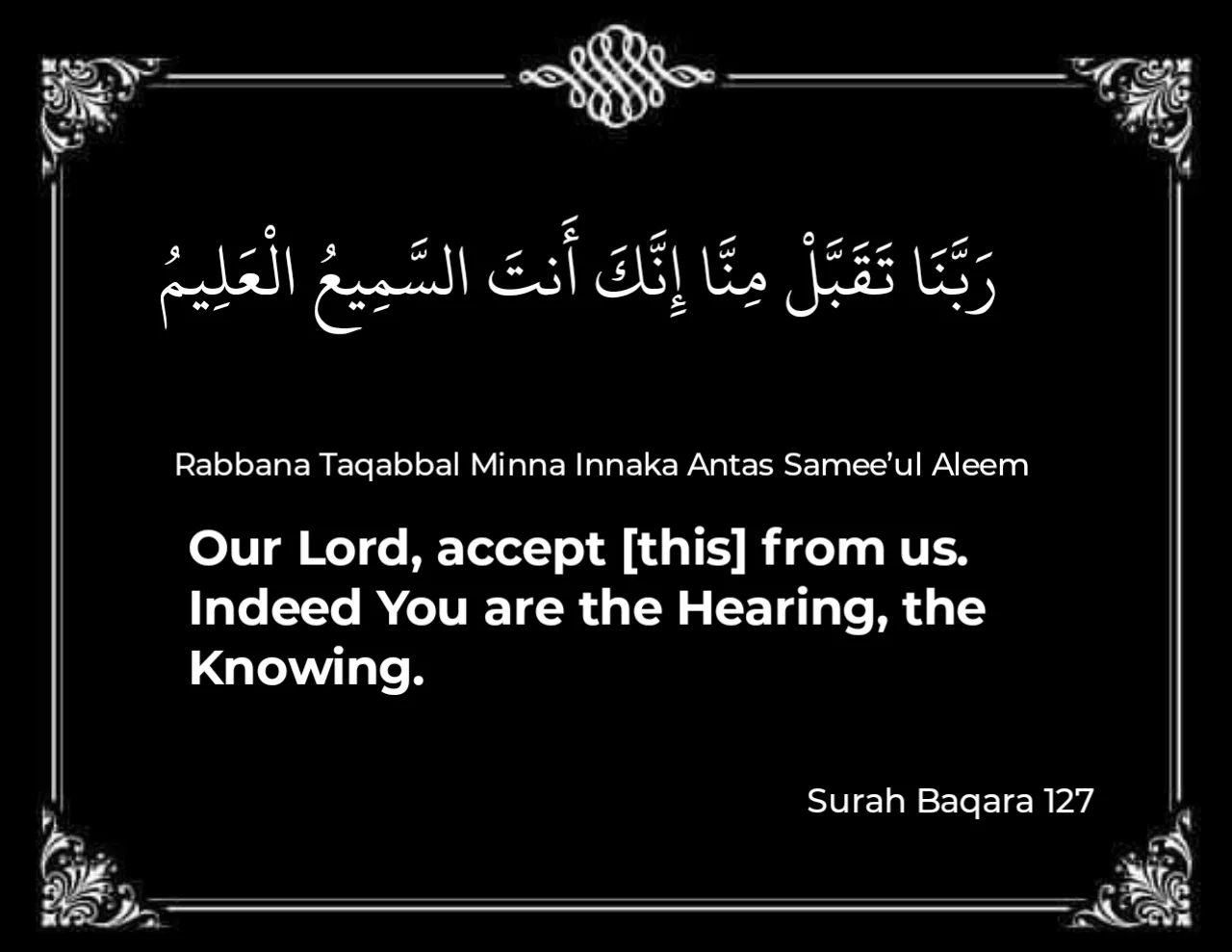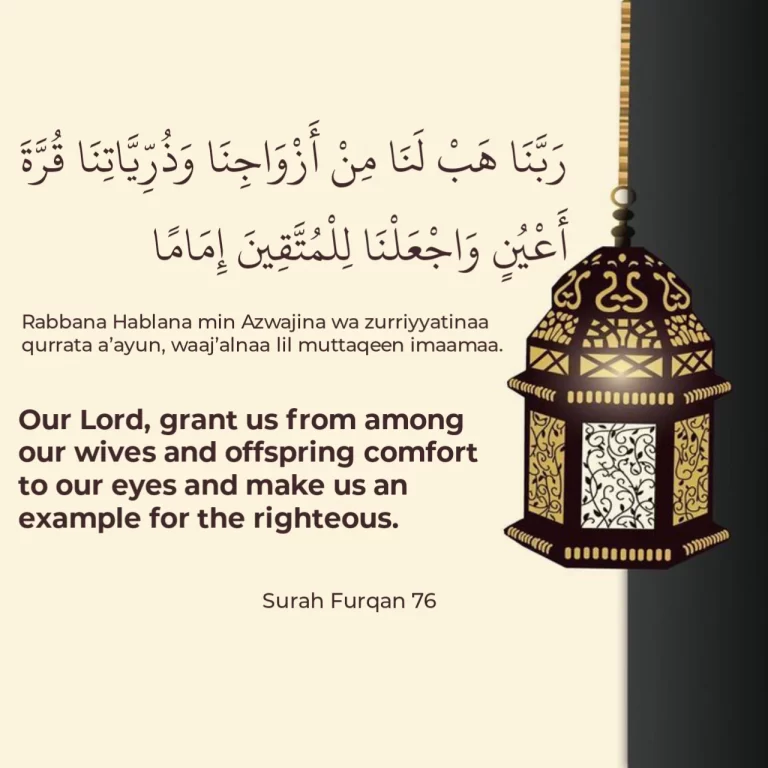Rabbana Taqabbal Minna Dua Meaning, Arabic Text, and Benefits
Advertisements
Rabbana Taqabbal Minna dua is a beautiful Supplication for acceptance of good deeds.
After every good deed we perform, the very first thing that needs to be done is to pray to Allah (SWT) to accept it from us.
Rabbana Taqabbal Minna Meaning in English
Rabbana Taqabbal Minna means Our Lord, accept [this] from us. Indeed You are the Hearing, the Knowing.
Rabbana Taqabbal Minna Dua In Arabic
رَبَّنَا تَقَبَّلْ مِنَّا إِنَّكَ أَنتَ السَّمِيعُ الْعَلِيمُ
Transliteration
The dua is transliterated as Rabbana taqabbal Minna, Innaka antas Sami ul Aleem.
Advertisements
Which Surah Is Rabbana Taqabbal Minna Innaka?
Rabbana Taqabbal Minna Innaka can be found in Surah Baqarah, the largest surah in the Qur’an. It can be seen in verse 127.
Simple Explanation Of Rabbana Taqabbal Minna Dua In English
This is a great supplications mentioned in the Book of Allah.
It is from the supplications of Prophet Ibrahim (Abraham), the imam of the Hanafis, and Khalil al-Rahman, whom our Allah described him as the one who combines all the qualities of goodness.
This blessed dua brought together several great and indispensable request for the servant in his religious and worldly matters.
The first: asking Allah for acceptance in deeds and sayings, so He and his son Ismail, peace be upon them both, said: “Our Lord, accept from us that you are the All-Hearing, the All-Knowing.
Advertisements
In this Dua, it is a warning to the servant to evoke these meanings as if they were in front of Him, from the noble deeds of raising the rules, as well as their supplication, so that the servant follows these great purposes and demands of devotion to Allah.
Consider reading:
- Allahumma Innaka Afuwwun Tuhibbul Afwa,
- Rabbish Rahli Sadri,
- Allahumma Inni As’alukal Huda
Reflect o son of Adam,
Prophet Ibrahim and his son, Prophet Ismail performed the highest and most exalted of deeds with the permission of their Lord, the Most High.
And they ask Our Lord, accept it from us, so contemplate how their condition was of fear and hope that their work would not be accepted.
The All-Hearing and All-Knowing are two names of Allah from His Beautiful Names that indicate the attribute of Hearing and Knowledge.
Meaning: You are the Hearer of our words, among which are our supplications, the All-Knowing of what is in the consciences of our souls of submission to You, obedience in word and deed, and nothing is hidden from You in our hearts.
And limiting the attributes of hearing and knowledge to Him, may He be exalted, to show the specialty of their supplications in Him, and the cessation of their hope for everything else besides Him.
And since the servant is no matter what, he must fall short and need repentance.
They said: And repent to us, they said it in order to digest themselves, and to teach the offspring after them to adhere to this request, and the great purpose.
And their saying: You are the Most Gracious, the Most Merciful:
This sentence, like the previous one, is an explanation for the request for acceptance, and a further summons for an answer.
The Merciful: that is, the one who has comprehensive mercy for the believers on the Day of Resurrection, and this name: is specific to the believers on the Day of Resurrection.
Benefits Of Rabbana Taqabbal Minna
1; Importance of acceptance, as the axis of righteous deeds revolves around it, based on sincerity to Allah the Almighty and adherence to the teachings of the correct Sharia.
2- The verse indicates that the servant must persistently seek acceptance of his deeds from Allah after performing them, including supplication.
This was part of the guidance of Prophet Muhammad SAW, as he used to seek forgiveness three times after prayers. After the fajr prayer, he would say,
“O Allah, I ask You for beneficial knowledge, goodly provision, and acceptable deeds.
He would also say, “O Lord, accept my repentance, wash away my sins, and answer my supplication,” seeking refuge from deeds that are not elevated, saying, “O Allah, I seek refuge in You from knowledge that does not benefit and deeds that are not raised,” and more.
3- The servant should approach his worship and supplication in a state of fear and hope, like the wings of a bird. Fear should not overpower him, leading to despair, nor should hope dominate, leading to arrogance.
4- Supplication to Allah by His names and attributes that suit the request and inquiry is recommended. For example, the All-Hearing is suitable for the hearing of their supplications, the All-Knowing for knowledge of their intentions and sincere supplications. Likewise, the Tawab (Accepter of Repentance) and the Merciful.
5- Adherence to humility and submission to Allah when performing His obedience, even in the smallest acts of worship and stations.
6- Supplication is the refuge and goal of all prophets and messengers. The servant cannot do without it in all his religious and worldly situations.
7- Reject self-admiration and refrain from boasting to Allah about one’s actions, as it corrupts the deed.
8- The importance of seeking Allah’s guidance for steadfastness in Islam, encompassing submission to Allah, outwardly and inwardly.
9- It is appropriate for a person to include his offspring in his supplications, as righteous offspring are among the effects of a righteous person, as Allah says, “And from our descendants, make us an Ummah submissive to You.”
10- The intense need of humans for their Lord is evident, as seen in the repetition of the word “Our Lord.” It emphasizes the need for the special Lordship of Allah, requiring His special care.
Advertisements








4 Comments